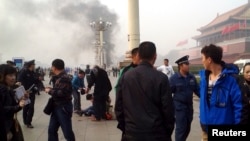BEIJING —
An Islamist militant group's speech claiming responsibility for a deadly car crash in Beijing's Tiananmen Square should silence skeptics regarding the threat of terror within China's borders, the country's Foreign Ministry said on Monday.
A group calling itself the Turkestan Islamic Party (TIP) has released a Uighur-language audio speech by its leader, Abdullah Mansour, in which he said the incident carried out by its mujahideen, or holy warriors, was only the beginning of attacks on Chinese authorities.
China blamed the East Turkestan Islamic Movement (ETIM) for the attack on Oct. 28, when a vehicle plowed through bystanders on the square and burst into flames, killing the three people in the car and two bystanders.
Authorities arrested five people they said were radical Islamists planning a holy war.
Foreign Ministry spokesman Qin Gang said ETIM and the organization that released the speech are the same group, which had revealed its true terror intent.
“This lays bare the terrorist essence of this organization and it also allows those people who recently suspected the nature of the incident to clearly see the truth,” Qin told a regular press briefing.
The Chinese government will “continue the assault” on this group, which has wrought havoc as it has sought to split China, Qin said.
Since the Tiananmen incident, security has been strengthened in both Beijing and in Xinjiang, China's restive far western region home to the Muslim Uighur ethnic group.
Many Uighurs resent controls imposed by Beijing and an inflow of Han Chinese migrants. Some Uighur groups are campaigning for an independent homeland for their people, who speak a Turkic language.
Uighur exiles, rights groups and some experts have cast doubt on the official accounts of what China has deemed terror attacks. Foreign reporting of the incident has discussed whether it was motivated by punitive ethnic policies.
A group calling itself the Turkestan Islamic Party (TIP) has released a Uighur-language audio speech by its leader, Abdullah Mansour, in which he said the incident carried out by its mujahideen, or holy warriors, was only the beginning of attacks on Chinese authorities.
China blamed the East Turkestan Islamic Movement (ETIM) for the attack on Oct. 28, when a vehicle plowed through bystanders on the square and burst into flames, killing the three people in the car and two bystanders.
Authorities arrested five people they said were radical Islamists planning a holy war.
Foreign Ministry spokesman Qin Gang said ETIM and the organization that released the speech are the same group, which had revealed its true terror intent.
“This lays bare the terrorist essence of this organization and it also allows those people who recently suspected the nature of the incident to clearly see the truth,” Qin told a regular press briefing.
The Chinese government will “continue the assault” on this group, which has wrought havoc as it has sought to split China, Qin said.
Since the Tiananmen incident, security has been strengthened in both Beijing and in Xinjiang, China's restive far western region home to the Muslim Uighur ethnic group.
Many Uighurs resent controls imposed by Beijing and an inflow of Han Chinese migrants. Some Uighur groups are campaigning for an independent homeland for their people, who speak a Turkic language.
Uighur exiles, rights groups and some experts have cast doubt on the official accounts of what China has deemed terror attacks. Foreign reporting of the incident has discussed whether it was motivated by punitive ethnic policies.





